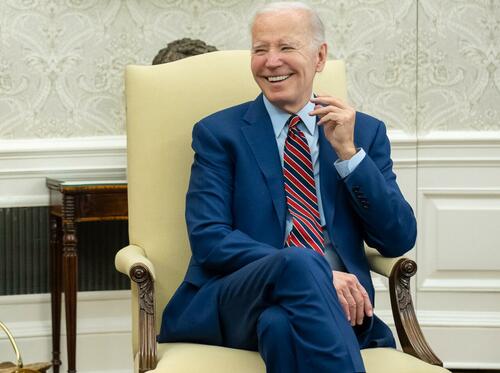The Biden Administration’s Scientific Integrity Policies
Authored by Curtis Schube via RealClearPolitics,
It is no secret that the Biden administration has prioritized insulating the administrative state from the will of the people. The goal is placing career officials on equal footing with agency leadership (i.e., political appointees). Undoing Schedule F, which would categorize federal employees with policymaking authority so as to not give them the same civil service protections as career employees, is a more high-profile example. But a lesser-known effort, detailed in a recent Council to Modernize Governance publication, is underway with scientific integrity policies.
Scientific integrity policies are not new. They were first developed in the late 1990s and focused science without predetermined outcomes informing policy decisions. They also required agencies to represent findings fairly and accurately. The Obama administration added that scientific integrity includes open discussion and firm commitment to the evidence. Clearly, this is good policy.
However, the Biden administration has quietly added new components to these scientific integrity policies. It issued an executive order directing agencies to curb “political considerations” or “improper influence” in science, which is clever rhetoric that hides the true intent.
The Office of Science and Technology Policy (OSTP) was the first to issue this policy change, stating scientific findings “must not be suppressed, delayed, or altered for political purposes….” The policy, which applies to agency leadership (i.e., officials appointed by a president), prohibits “interference” in the “design, proposal, conduct, management, [and] evaluation” of studies. Yet it requires scientists to be included in policy decisions. Indeed, prohibiting the “design” of a study or the action of even “proposing” one –a critical step for many efforts – effectively boxes out those running federal agencies from their own agency’s direction.
The policy creates an avenue for employees to report one another should they perceive said “improper influence.” But these types of rights already exist in the form of Inspector General or EEOC complaints and are unnecessary. But this reporting protocol would likely have a bottom-up effect, where a subordinate employee would hold a trump card over a superior. Encouraging employees to report one another for outside-the-box thoughts hardly fosters ingenuity (or a cohesive work environment).
The policies themselves also appear to undermine, rather than protect, scientific integrity. For instance, the administration’s mandating of equal treatment for “indigenous knowledge” is worrisome. Science should be objective, rigorous, and subject to peer-review and replication. Indigenous knowledge offers us none of these characteristics, as it is based upon tradition. And which indigenous voices will get priority? For example, the Department of the Interior recently relied upon one version of indigenous knowledge to oppose energy development in ANWR over the indigenous knowledge of local Alaska tribes who favor such development. Situations like this prove the value of objective science guiding policy decisions.
Identity politics is another suspect priority. Strangely, the policies go out of their way to require inclusivity “of all scientists,” which is followed by diversity, equity, and inclusion language. One’s sex, race, sexual orientation, etc. seemingly has little bearing on objective evidence.
Many agencies, including the EPA and the Department of Health and Human Services have implemented similar changes. EPA leadership is currently negotiating with the agency workers’ union to embed these policy changes within the collective bargaining agreement. This means that the government is headed toward a binding contract between it and the union, which can be harder to undue than a simple regulation.
The dangers are clear. Consistent with repealing Schedule F, the idea appears designed to prevent career employees from having to answer to agency leadership appointed by future administrations. Given that agency leaders are ultimately the only people within an agency who are subject to the will of the people (elections), the effort is hardly democratic.
It is likely illegal too. These policy changes are effectively a disguised effort to protect certain policy preferences during future administrations by propping up employees who have never been appointed. But the Appointments Clause gives the President alone the authority to appoint officers of the United States. An officer of the United States is one who “exercise[es] significant authority pursuant to the laws of the United States.” Handing a portion of this authority to employees and greatly limiting their respective constitutional officers’ review effectively makes those career employees unappointed officers of the United States. This is in direct opposition to the design of our Founding Fathers.
A future administration should act immediately to restore the well-intentioned scientific integrity policies from prior administrations. The American public deserves, and the Constitution requires, federal agency leaders who are empowered to make informed decisions and be accountable to the people. This cannot occur in an environment where decisions are dictated by subordinates with pre-determined outcomes.
Curtis Schube is the Executive Director for Council to Modernize Governance, a think tank committed to making the administration of government more efficient, representative, and restrained. He is formerly a constitutional and administrative law attorney.
Tyler Durden
Mon, 05/20/2024 – 21:00
via ZeroHedge News https://ift.tt/c2YytJG Tyler Durden
